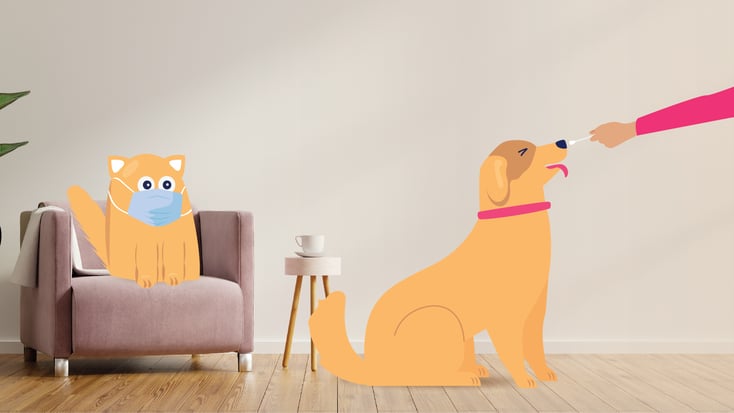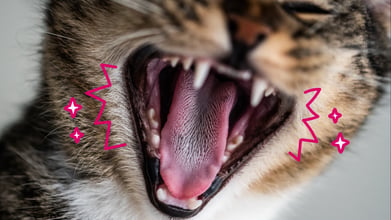Can Pets Get COVID?

Since the start of the COVID-19 pandemic in 2020, pet owners have had concerns about the risk of spreading COVID to their pets.
Over the past couple of years, there have been a small number of confirmed cases in animals around the world.
Key Takeaways:
- Cases have been documented where pets, including dogs and cats, have tested positive for SARS-CoV-2, typically after close contact with humans who have COVID-19.
- Pets do not play a significant role in spreading the virus to humans. The primary mode of transmission of COVID-19 is human-to-human.
- reat pets as you would human family members to protect them from potential infection. This includes avoiding close contact if you're sick, keeping them indoors or limiting their interactions outside the household, and maintaining good hygiene practices.
So, what is the risk to your pets? We’ll explain a bit more about the risks to your pet, and what the scientists know so far.
Can Pets Get COVID?
Yes, pets can get COVID-19. There have been documented cases of pets, including dogs and cats, testing positive for SARS-CoV-2, the virus that causes COVID-19. These cases often occurred following close contact with people who had COVID-19.
While there is a small risk that our pets could catch COVID from us, it’s very unlikely that you will catch the virus from your pet.
Several cases have been reported around the world in dogs and cats, as well as other species, where close contact with an infected human has led to them contracting the virus. Most cases of dogs and cats contracting the virus have been found in animals who have close contact with an infected person such as their owners.
While there is a risk of spreading the virus to your pets when you have COVID, it’s important to remember that it is still an extremely rare occurrence, and you are more likely to catch the virus from another infected human.
What are the Symptoms of COVID in Pets?
In the cases that have been reported and investigated in animals, we have learned that they do not experience the illness in the same way as humans do. Dogs very rarely show any signs of illness at all.
Some cats that have tested positive for COVID have shown some mild respiratory symptoms such as coughing or breathing problems, vomiting, and diarrhea.
Symptoms of COVID-19 in animals can include:
- Coughing
- Sneezing
- Breathing difficulties
- Fever
- Lethargy
- Discharge from the eyes or nose
- Vomiting
- Diarrhea
If you think your pet has symptoms of COVID-19 and has been in close contact with an infected human, you should contact your vet as soon as possible to discuss the case. You should follow the guidance of your vet as well as any local government advice.
Caring for Your Pet if You Have COVID-19
If you have COVID, you can reduce the risk of spreading it to your furry family members by taking a few simple measures.
The following steps can help reduce the spread of infection to your pets -
- Wash your hands thoroughly before and after touching your pets or their bowls and toys
- Limit close contact such as cuddling and kissing
- Do not cough or sneeze over your pet – do so into a tissue or your elbow and dispose of it hygienically, and wash your hands thoroughly
- Do not share food or drink with your pet
- Wear a mask or face covering if possible
- Clean surfaces regularly with a suitable disinfectant
CDC guidelines suggest that if you think your pet has COVID you should treat them in a similar way to an infected person:
- Keep cats indoors
- Do not allow anyone to pet your dog, and walk them on a lead
- Avoid walking dogs in busy areas
- Do not let them interact with other animals
You should NEVER:
- Put a mask or any face covering on your pet
- Wipe your pet with antibacterial wipes or bathe your pet in disinfectant, as this is extremely dangerous. There is no evidence that the virus can spread from the fur, skin, or hair of your pets
- Isolate your pet completely
Summary
Covid-19 is a highly contagious virus that is known to cause mild to severe illness in humans. It is also known that the virus can spread to pets, and a small number of cases have been recorded in animals that have been in close contact with infected humans. However, these cases are very rare, and animals rarely display severe symptoms, if any at all. It’s essential to speak to your veterinarian and follow guidance if you think your pet may be infected.
Frequently Asked Questions
Can dogs and cats get COVID?
Yes, dogs and cats can catch COVID through close contact with an infected person. Although it is very rare, pets are very unlikely to spread COVID to humans.
Useful guidance and information can be found at https://www.cdc.gov/coronavirus/2019-ncov/downloads/covid-19-pets-prevention.pdf
Can I give COVID to my pet?
Yes, there is a risk that your pet could catch COVID from you if you’re infected and are in close contact with your pet. However, note that this is very rare.
What should I do if I think my pet has COVID?
If you are concerned your pet may have COVID you should contact your vet as soon as possible. You should follow any advice you are given, as well as adhere to local government guidance if you are also unwell.






